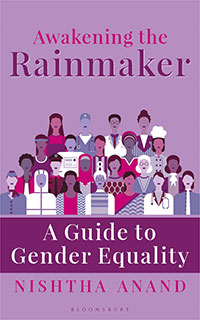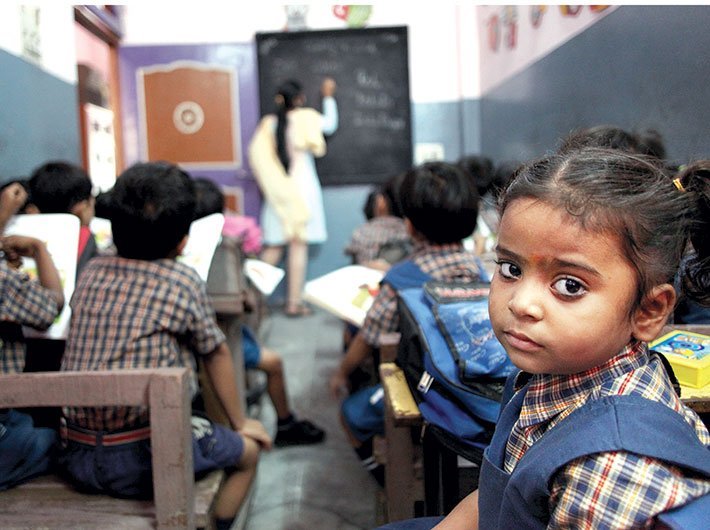 Awakening the Rainmaker: A Guide to Gender Equality
Awakening the Rainmaker: A Guide to Gender Equality
By Nishtha Anand
Bloomsbury India, 268 pages, Rs 499
Half the sky belongs to them, but on earth women are usually pushed to a corner. In family, workplaces and various walks of life, they remain under-represented. Governments have tried several interventions; society has come to agree in principle that boys and girls, men and women are on equal footing; but in practice structural inequalities remain. Yet, change is taking place, even if it is three steps ahead and two back.
The momentum of change can go up if we, as individuals, are more alert to gender prejudices and work to counter them, at the dinner table, in classrooms, in offices, in city buses and elsewhere.
Nishtha Anand, a strategy professional with experience in investment banking and strategy, has written a highly readable guide to this process of empowerment, ‘Awakening the Rainmaker’. She tells life-changing stories. She speaks with some of the most influential women in India, and Padma awardees, sportspersons, CEOs and others tells the reader how they made it and what each of us needs to do to let others make it.
It is “a much needed piece of work carved out taking into account the peculiar situation of Indian women who tread and balance multiple stakeholders – spouse/partner, children, parents, in-laws, relatives (the society!), corporate stakeholders, the likes of managers, peers, juniors, HR, etc. (if the woman is working).”
The book was “born out of the need to nudge women, their families and organisations with practical hacks for awakening the rainmaker in them who is hidden and burdened by the compulsion to lead a life defined by society’s gender template.”
Here is an excerpt from the book:
CALL TO ACTION
[Gender equality is] the great unfinished business of the 21st century.
—Hillary Clinton
Lawyer and politician
As a parent, be equal and fair. As an individual, be assertive. As a professional, be open-minded and pragmatic. As a leader, be free of bias and walk the talk on equality. That would be my earnest request to all my readers.
I’d like to reiterate a few key takeaways for different stages of life and where each one of us can make a difference.
A gender-neutral approach
History will judge us by the difference we make in the everyday lives of children.
—Nelson Mandela
Former President of South Africa
For grassroots change towards achieving gender equality in its true sense, the most important step is a gender-neutral upbringing. Only when we raise children by giving them equal opportunities and imparting the same set of values will we enable them to realise their potential. Therefore, the next time you come across a karate class, have both your son and daughter give it a try. Basic life skills such as cooking and self-defence should be taught to both boys and girls. Empower them to be the best version of whatever they seek to be; raise your kids as bundles of unlimited potential unrestricted by their gender. Don’t let the conventions of society dictate to you how to raise your children. Bring in the change you want to see in the world.
My husband and I have taken a pledge to raise our child as an individual capable of realising her potential to the fullest by providing a nurturing environment for her to grow in. We won’t let our parenting philosophy be governed by age-old conventions defined by gender. I invite all the mothers and fathers reading this book to take the same pledge and spread awareness around them (#MothersPledgeToEquality and #FathersPledgeToEquality). Let each child grow up freely to realise their personal calling unhindered by societal norms and definitions.
Assertiveness in action
Every time we liberate a woman, we liberate a man.
—Margaret Mead
Cultural anthropologist and writer
Just like we wholeheartedly teach our children ‘A for apple’, as adults let’s wholeheartedly learn ‘A for assertive’ and see to it that we raise our voice if we experience any bias or observe any instance of it around us. United we will stand and win, while divided we will fall to the age-old inequalities and gendered approach to living. Let’s walk towards gender equality with a consistent and committed effort with no deviations, because even one exception runs the risk of making it the norm.
Freedom of choice
May your choices reflect your hopes, not your fears.
—Nelson Mandela
Former President of South Africa
When it comes to the choices we need to make from time to time, just remember to do so with free will. Pave your own way as your circumstances allow rather than giving in to societal pressures and expectations.
While making a career choice, evaluate the organisation on the diversity management parameter and the nature of policies it has to ensure the inside-out wellness of all its employees. An organisation with a healthy representation of diverse people is not only fair
in its practices but is also merit led, devoid of biases and performs better financially. Such an organisation can prove to be a better employer in the long run and be the place where one can make a career for life.
As I draw to the end of the book, I recall an African proverb, ‘If you educate a man you educate an individual, but if you educate a woman, you educate a nation’. So, let’s focus on educating all women, all mothers, and urge them to live up to their potential and pursue their passion rather than getting lost in the stereotypical template that society has defined for them. With a pragmatic, non-gendered approach to parenting, let the upcoming generation of girls blossom into empowered women and let the upcoming generation of boys turn into respectful men who, rather than feeling emasculated with the growing ambition of women, know how to share the load and live in a society of emancipated women reaching heights in personal as
well as professional life.
While I pray, hope and work towards a new beginning, here is a closing thought for fellow parents:
There are two things we should give our children—one is roots and the other is wings.
[Excerpt reproduced with the permission of the publishers.]
